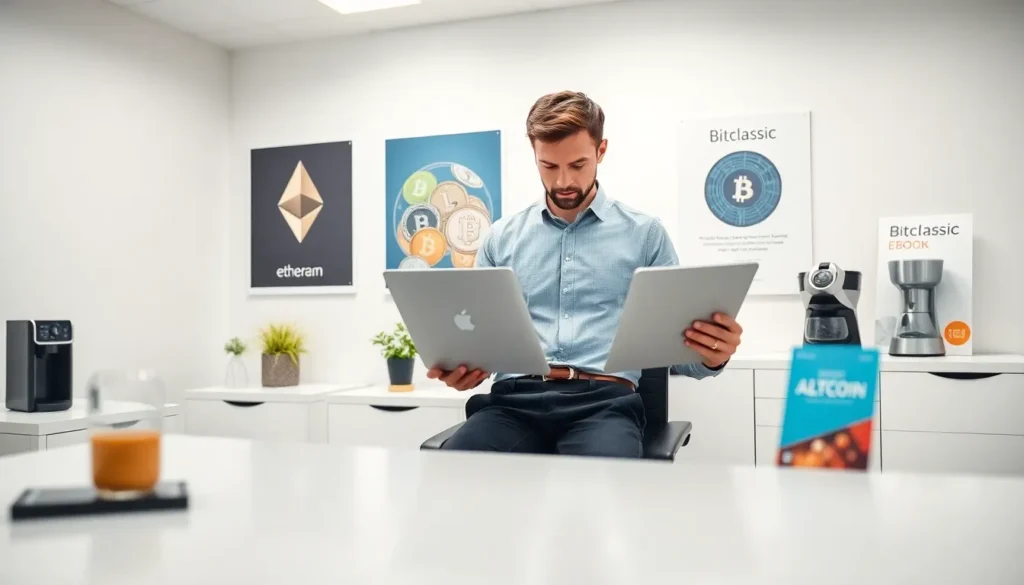Table of Contents
ToggleNavigating the world of cryptocurrency can feel like trying to find your way through a maze without a map, can’t it? Luckily, we’re here to help illuminate the path with our guide to altcoin wallets. In the vibrant realm of altcoins, understanding how to store your digital treasures safely and efficiently is critical. So, if you’ve ever dreamed of becoming a savvy altcoin investor while sipping coffee, this is your opportunity. You’ll learn everything from the basics of altcoins to eclectic wallet options. Let’s dive right in and uncover the secrets of managing your crypto riches.
Understanding Altcoins and Their Importance

Altcoins refer to any cryptocurrency other than Bitcoin. These digital currencies include some familiar names like Ethereum, Litecoin, and Ripple, each with its unique selling points and ecosystems. With thousands of altcoins in circulation, it’s crucial to understand their significance in diversification and potential value appreciation.
Investing in altcoins can be a strategic move. While Bitcoin often captures the headlines, alternative coins can offer opportunities for substantial returns. Investors look for the next big thing, driving demand and innovation within the crypto space. Each coin has its technology, use case, and community, adding to this fascinating digital tapestry. So why bother with altcoins? Simply put, they’re a way to potentially increase your gains while injecting some excitement into your investment portfolio.
Also, the altcoin market can be seen as a breeding ground for innovation. Projects like smart contracts and decentralized finance (DeFi) thrive within the altcoin ecosystem. Understanding this landscape gives investors an edge, allowing them to make informed decisions about where to allocate their resources.
Summarizing, altcoins play a pivotal role for investors and developers alike, offering chances to profit and advance technology’s frontiers.
What Is an Altcoin Wallet?
Now that the excitement of altcoins is clear, the next step is figuring out how to store them safely. An altcoin wallet is akin to a digital safe, designed to manage, transfer, and hold your altcoins. Unlike traditional wallets, crypto wallets don’t physically store your coins. Instead, they store the public and private keys necessary for transactions on the blockchain.
Altcoin wallets come in various forms, each with its pros and cons, catering to different preferences and needs. Whether it’s enhanced security or convenience you’re after, there’s something for every investor. Understanding these wallets is crucial: even a small mistake could lead to irreversible losses.
As you dive deeper into this realm, remember that your choice of wallet impacts your security and investment potential. Exploring various wallet types will lead you down a path of informed decisions, ensuring your altcoins remain in safe hands.
Types of Altcoin Wallets
When it comes to altcoin wallets, diversity is the spice of life. Here are some popular types:
Software Wallets
Software wallets are easily accessible via your computer or mobile device. They come in two flavors: hot wallets (online) and cold wallets (offline). Hot wallets provide convenience for daily trading, while cold wallets offer enhanced security.
Hardware Wallets
For those wary of online threats, hardware wallets offer a superb solution. These physical devices store private keys offline, making it virtually impossible for hackers to access your assets. While they come at a cost, the peace of mind they deliver is invaluable.
Paper Wallets
While it may sound old-fashioned, paper wallets are both inexpensive and secure. By printing out your keys on paper, you eliminate the risk of digital vulnerabilities. Just remember to keep your paper safe, as a lost wallet means lost coins.
Mobile Wallets
These wallets are apps designed for smartphones. They offer the convenience of carrying your altcoins wherever you go but come with increased risks associated with mobile devices.
Web Wallets
Accessible through browsers, web wallets are user-friendly but potentially vulnerable to hacks. If you plan to use one, make sure it’s from a reputable source.
How to Acquire Altcoins Effectively
Acquiring altcoins can be a straightforward process if approached correctly. Investors can buy them through exchanges, earn them via mining, or even receive them as payment for goods and services.
It’s vital to research different platforms for buying altcoins. Various exchanges offer different altcoins, fees, and security measures. Alternatively, peer-to-peer trading allows investors to buy directly from other users, making it a flexible option for acquiring desired coins.
Utilizing the Bitclassic eBook
To navigate the complexities of altcoin acquisition, using resources like the Bitclassic eBook can be immensely beneficial. This comprehensive guide breaks down various strategies for identifying altcoins worth investing in. It also offers practical advice on trading techniques, security precautions, and market trends. Having reliable information at your fingertips can make a considerable difference in your investment journey.
Safety and Security Tips for Altcoin Wallets
When it comes to altcoin wallets, safety is non-negotiable. Here are some essential tips to help users safeguard their digital assets:
- Choose Reputable Wallets: Before entrusting your coins to any wallet, do thorough research. Look for wallets with positive reviews and robust security features.
- Enable Two-Factor Authentication (2FA): By doubling the security, 2FA adds an extra layer, making it more challenging for potential hackers.
- Keep Your Software Updated: Regular updates help patch vulnerabilities and enhance security features.
- Backup Your Wallet: Always create a backup of your wallet details and store it in a secure location. If something happens to your device, you don’t want to lose your assets.
- Use Strong Passwords: Passwords should be complex, using a mix of upper and lower case letters, numbers, and symbols.
- Be Wary of Phishing Attacks: Exercise caution when clicking links or providing personal information, especially in unsolicited emails.
- Consider Hardware Wallets: For long-term storage, hardware wallets provide an unmatched level of security, as they’re less susceptible to online attacks.
By implementing these strategies, investors can feel more secure while navigating the altcoin landscape.




